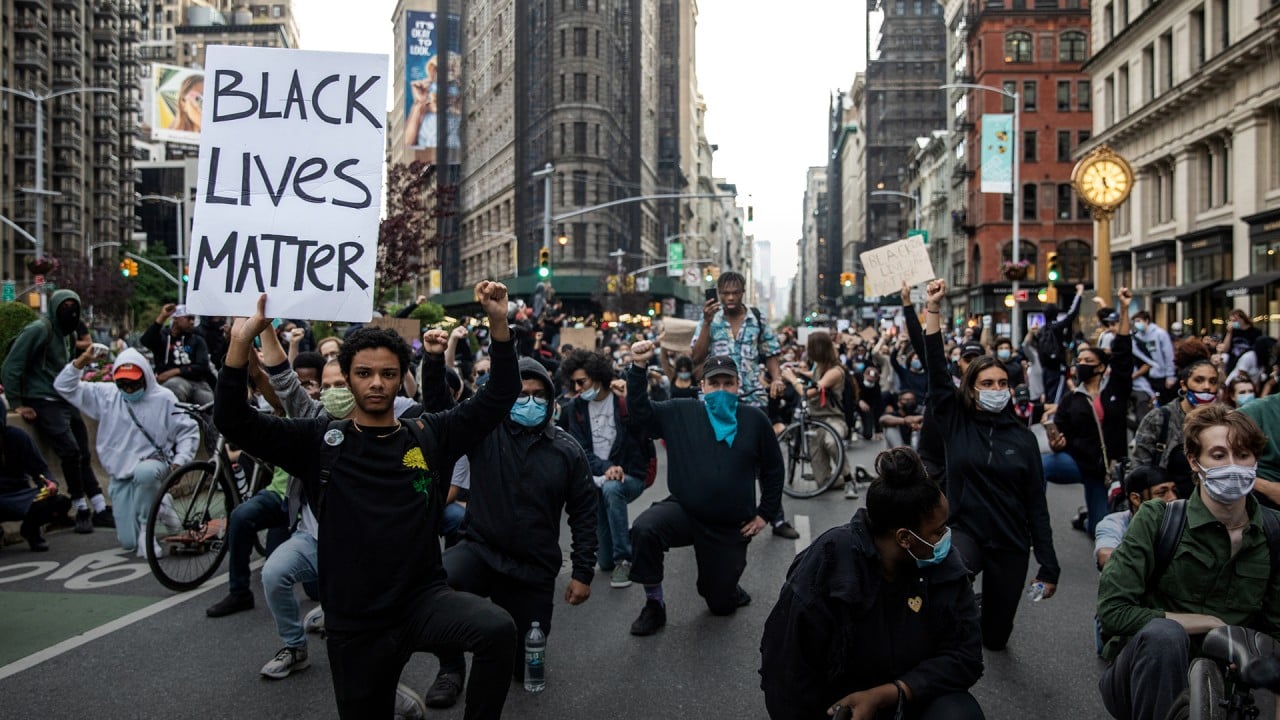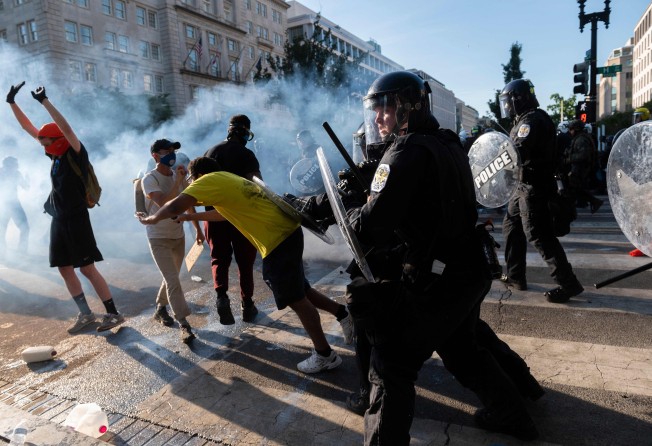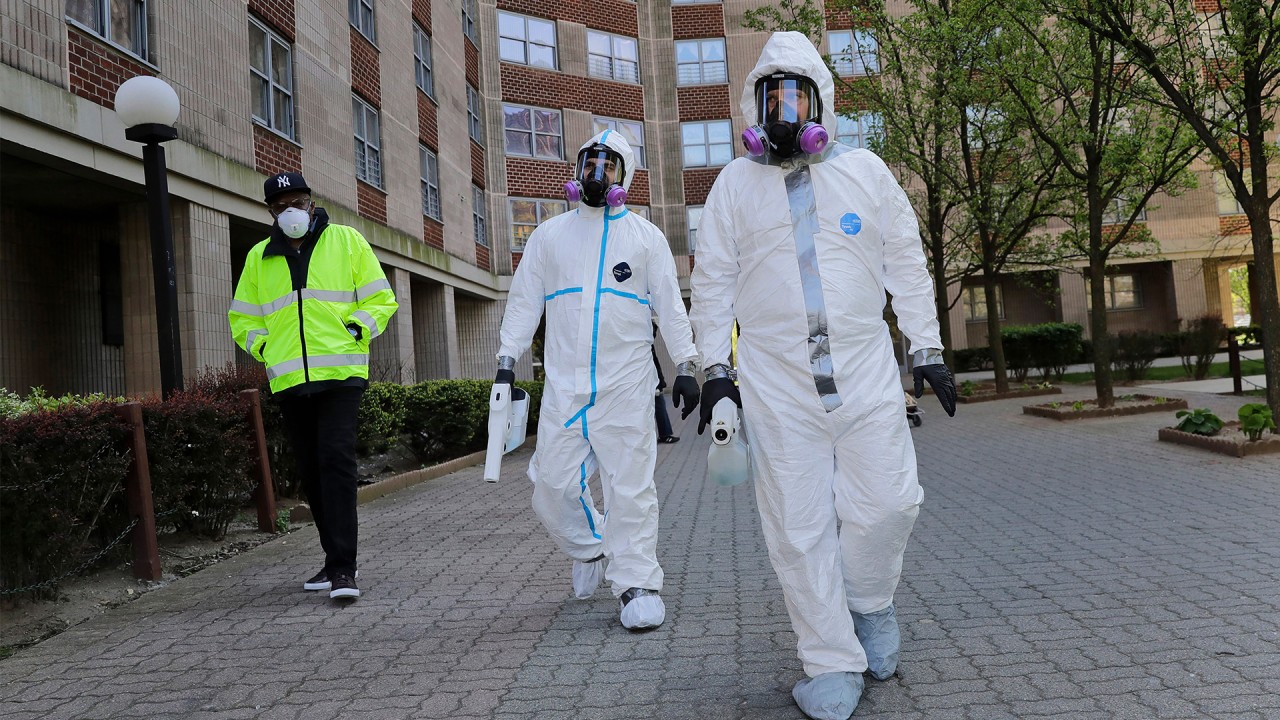
03:30
Asian-Americans in New York among those joining US protests after George Floyd’s death

Even before America experienced its worst period of unrest since the civil rights era, financial markets and the global economy had seemed to be moving in parallel worlds.
The dramatic rally in the benchmark S&P 500 stock index in the face of the mounting human costs of Covid-19 and the sharpest contraction in global output since the 1930s has taken the disconnect between asset prices and fundamentals to a whole new level. The index is up nearly 40 per cent since hitting a three-year low on March 23, and is less than 8 per cent below its all-time high.
As I argued previously, the catalyst for the rally was the unprecedented monetary and fiscal support from the world’s leading central banks and governments, which have pledged to do “whatever it takes” to revive growth.
The determination of policymakers, led by the US Federal Reserve, to backstop the financial system has reassured investors, who view the massive amounts of liquidity as a crucial bridge to keep markets stable until the post-lockdown recovery takes hold.
Yet, the foundations of this bridge are fragile, under strain from the multifaceted shock of the pandemic. While the focus has been on the health and economic crisis, the political fallout from Covid-19 is proving just as consequential.

03:30
Asian-Americans in New York among those joining US protests after George Floyd’s death
The coronavirus pandemic has inflamed tensions between Washington and Beijing, further undermining the credibility of January’s phase-one trade deal and heightening concerns over Hong Kong’s status as Asia’s top financial centre.
In Europe, the pandemic has exacerbated divisions over the political and economic governance of the euro zone, partly because the virus hit the bloc’s members unequally, with Italy – the worst-affected country – resentful that the European Union did not show financial solidarity sooner.
Meanwhile, in Britain, the government’s severe mismanagement of Covid-19 has made it more difficult to suppress the virus, undermining the authority of Prime Minister Boris Johnson, just as concerns about a no-deal Brexit re-emerge.
Yet, it is the sudden breakdown of order in the United States that poses the biggest threat. Not only has the unrest – which was triggered by a harrowing video of a white Minneapolis police officer kneeling on an unarmed black man’s neck for several minutes, even after he became unresponsive – displaced the pandemic as the dominant news story, it has also revealed the extent of the disconnect between Wall Street and Main Street.
To be sure, markets have a long history of brushing off periods of social and political upheaval, particularly in the US. In 1968, the year in which the assassination of Martin Luther King sparked race riots in several cities, helping Richard Nixon win the presidential election on a law-and-order platform, the S&P 500 gained 7 per cent. Stock markets also proved resilient to social unrest in Los Angeles in 1992 and Ferguson, Missouri in 2014.
Yet, unlike earlier protests, today’s upheaval is being exacerbated by an epidemic that is still spreading rapidly in many states (and has disproportionately affected lower-income African-Americans) and the worst recession since the 1930s.
Leaving aside the frightening prospect of a military crackdown against the protesters and the worry of a racially polarising election in November, the unrest puts more pressure on the foundations of an equity rally that were shaky to begin with.
First, the widespread protests come when there is mounting concern about a major second wave of infections as lockdowns are gradually lifted across the US. Many public health experts fear the mass gatherings could set off a surge in new cases, especially if a superspreader is present.
Andrew Cuomo, New York’s governor, warned that the unrest “could probably be infecting hundreds and hundreds and hundreds of people after everything we’ve done”.
Second, if the demonstrations persist, they could compromise the reopening of the US economy, a key factor behind the sharp improvement in sentiment in recent weeks, and one reason US stocks are priced for perfection.

02:50
Inside one of NYC’s worst-hit communities, home to many essential workers and elderly residents
As UBS noted in a report published on Tuesday: “The strength of the economic bounce-back is dependent on keeping fear as low as possible. Fear is likely to remain high across the political spectrum while this unrest continues.”
Still, while Covid-19 is widening America’s social and political divide, there are signs that it is acting as a catalyst for much-needed change in the governance of the euro zone.
The unexpected announcement on May 18 that Germany and France had agreed for the first time to introduce a form of fiscal burden-sharing to pay for a recovery programme suggests that the pandemic is forcing the euro zone to integrate more closely. The euro has risen nearly 4 per cent against the dollar since the initiative was announced.
However, the plan could still be watered down, or even derailed, while the economic devastation wrought by the virus is likely to nourish nationalist and populist sentiment in Europe, especially Italy.
As liquidity-fuelled stock markets continue to grind higher, investors would do well to pay more attention to political risks, particularly since the swift post-lockdown recovery that is currently priced in hinges critically on these threats receding.
Nicholas Spiro is a partner at Lauressa Advisory